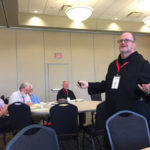
Bishop Robert Barron remembers a retreat director asking retreatants to “call to mind a person that we found hard to take and then to recount in detail the characteristics that made the person so obnoxious to us.” The retreat director then recommended the retreatants go back to their room and “ask God to forgive those same faults in ourselves” (Gospel reflection, June 21, 2021).
In our country and, sadly, in our church, our focus is on demanding that our adversaries repent for their faults, which blinds us to our own. Forgiveness is sorely lacking, even though at every Mass we ask for our Lord’s mercy and for God the Father to “forgive us our trespasses as we forgive those who trespass against us…” How do we transform rote recitation into the lived experiences of our daily life, in our interactions with others?
We would benefit immensely from the insight of Jesuit Father Greg Boyle, founder of Homeboy Industries, which gives former gang-involved and previously incarcerated people the opportunity to become contributing members of the community. The insight appeared in this excerpt from the June 24 Catholic Sentinel, newspaper of the Archdiocese of Portland:
“… Homeboy seeks to be God’s conduit, and staff have seen many gang members change radically after someone at Homeboy expresses tenderness. Sparring Catholics could do the same for each other, the priest suggested.
‘We’re all just trying to walk each other home,’ he said. ‘Otherwise you think it’s about winning the argument. No, [we should say,] ‘You belong to us and we will help you to find wholeness.’ ‘Moralism has only kept us from each other.’”
“We’re all just trying to walk each other home.” We ought to copy that insight on a sticky note and put it on the refrigerator, our computer screen or the bathroom mirror. Those words should be imprinted in our hearts and minds. We may disagree, respectfully, about how we apply church teaching in our complicated, fractured world, but we ought to acknowledge agreement in our love for our Triune God and our desire to be with God for eternity.
As human beings, we make mistakes and must ask forgiveness from others, from God and from ourselves. We avail ourselves of the sacrament of reconciliation, the Eucharist and our faith community to fortify our commitment to continuing that journey to our God.
Back to Bishop Barron’s Gospel reflection from June 21 (Matthew 7:1-5), in which Jesus admonishes his disciples to “Stop judging, that you may not be judged. For as you judge, so will you be judged.” We know, as Bishop Barron said, that one of the favorite pastimes of most human beings is criticism of others. It is a “function of pride and egotism: the more I put someone else down, the more elevated I feel.”
He said it is also a “magnificent means of turning a mirror on ourselves, to see what usually remains unseen. Why, we ought to ask, do we find precisely this sin of others particularly annoying? Why does that trait or sin of a confrere especially gall us? Undoubtedly, Jesus implies, because it reminds us of a similar failing in ourselves.”
Consider subscribing to Bishop Barron’s daily Gospel reflections (DailyCatholicGospel.com), which often inspire an examination of conscience. Now, more than ever, we need to look in the mirror, reflect on our own faults and then recall Father Boyle’s statement, “We’re all just trying to walk each other home.”
Barb Arland-Fye, Editor
arland-fye@davenportdiocese.org











